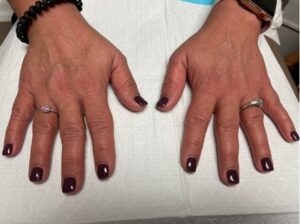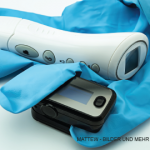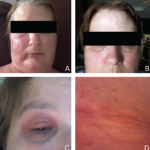She had a past medical history of hypertension, vitamin D deficiency and polycystic ovarian syndrome. Her medications included lisinopril, hydrochlorothiazide and vitamin D. The patient’s surgical history included only a remote history of tonsillectomy. She reported an allergic reaction to sulfa antibiotics resulting in a rash and laryngeal edema.
In regard to her social history, she had no history of smoking, alcohol use or illicit drug use. She worked as an elementary school teacher and was able to perform her basic activities of daily living (ADLs) without any limitations. The patient denied any notable medical diagnoses in her three children apart from a history of IgA vasculitis in one of her sons. Her father was born in China, and her maternal family originated from Cuba. She denied any history of travel and did not own any pets. There was no known family history of periodic fever syndromes.
On physical exam, the patient’s vital signs were within normal limits, with a temperature of 98.9ºF. The only notable findings were an erythematous rash along her upper chest (see Figure 1) and synovitis of both the second and fourth proximal interphalangeal joints (see Figure 2). She had no palpable lymphadenopathy, parotid enlargement, conjunctivitis or oral ulcers. The cardiopulmonary examination was unremarkable. An abdominal examination revealed a non-tender abdomen without distention, rebound or hepatosplenomegaly. Muscle strength testing was normal, and she had no neurological deficits.
Testing in 2009 ruled out an infectious etiology; the investigation was largely unremarkable apart from a positive Epstein-Barr virus (EBV) IgG titer. Further evaluation was halted until the patient had a recurrence of her episodes four years later, when she again underwent extensive testing for an infectious cause of her symptoms, this time at an academic medical center. Stool cultures, blood cultures, viral hepatitis, HIV, QuantiFERON-TB, parvovirus, testing for Lyme disease, rickettsia, C. difficile, blastomycosis and histoplasmosis all came back negative. The patient’s complete blood count, comprehensive metabolic panel, erythrocyte sedimentation rate, C-reactive protein and urinalysis were all within normal limits on multiple occasions. Other tests, such as creatinine kinase, aldolase, thyroid-stimulating hormone (TSH), serum protein electrophoresis and serum immunoglobulins, came back normal, as well. Testing for celiac disease was negative. A rheumatologic evaluation was negative for anti-nuclear antibodies, including any extractable nuclear antigens, anti-neutrophil cytoplasmic antibodies (ANCA), rheumatoid factor, anti-cyclic citrullinated peptide (CCP) antibody, HLA-B27 and angiotensin-converting enzyme levels.


